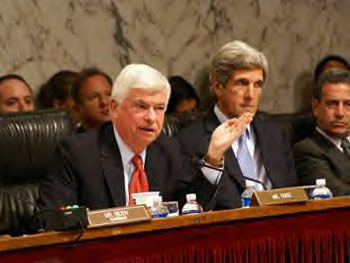 I was on the road and essentially off-line all day yesterday, so forgive me for being late to comment on Senator Chris Dodd’s newest and most bizarre proposal for some kind of consumer financial protection agency.
I was on the road and essentially off-line all day yesterday, so forgive me for being late to comment on Senator Chris Dodd’s newest and most bizarre proposal for some kind of consumer financial protection agency.
In his third bid in as many days to win over a few token Republicans, the Senate Banking chairman is now proposing to create an enfeebled new consumer regulator inside the Federal Reserve.
Say what???? This is the same Chris Dodd who, four months ago, accused the Fed of being “an abysmal failure” as a regulator and unveiled a bill that would have stripped it of virtually all its supervisory powers.
“Over the last number of years when [the Fed] took on consumer-protection responsibility and regulation of bank holding companies, it was an abysmal failure,” Dodd declared at a press conference in November 9.
Dodd’s original bill was dead on arrival, in part because it went too far in its anti-Fed zeal and alarmed Democrats as well as Republicans on the banking committee.
But now Dodd the Fed-basher is proposing to make the Fed an even more important consumer regulator than before.
“It’s almost like a bad joke,’’ Rep. Barney Frank, chairman of the House Financial Services Committee, told Politico on Tuesday.
Like both Frank’s bill, which has passed the House, Dodd’s original bill would have created a stand-alone Consumer Financial Protection Agency that would be have the power to write rules and enforce them.
The central idea was not to expand regulatory power. It was to consolidate the existing consumer-protection powers of bank regulators into a separate agency that would be more focused and less likely to be co-opted by the very banks they regulated.
But Dodd has groveled so much for support from a few token Republicans that he has lurched from one incoherent proposal to another.
Last Friday, he proposed dropping the stand-alone agency in favor of an emasculated “Bureau of Financial Protection” inside the Treasury Department. Consumer groups immediately protested, pointing out that the “bureau’’ would have limited enforcement power and could be blocked by the other bank regulators.
More surprisingly, Dodd’s Republican counterparts on the committee – Bob Corker of Tennessee and Richard Shelby of Alabama – immediately rejected the compromise as still far too restrictive. As Felix Salmon has remarked, it makes you wonder what Republicans would ever accept.
On Monday, Dodd floated the idea of putting consumer protection inside the Federal Deposit Insurance Corporation. Still no dice. Finally, Dodd proposed putting it in the Fed – the same Fed that was rightly attacked for utterly failing to clamp down on no-doc loans and all the rest until it was too late.
I am not a Fed-basher, per se. Neither is Barney Frank, whose own bill would create a standalone consumer agency but would also increase the Fed’s power to rein in Too-Big-To-Fail institutions. It’s a good move: the Fed has unique expertise in that area.
But even Fed officials admit that they failed to crack down on liar’s loans and the other exotic mortgages that nearly destroyed the financial system. That’s why Ben Bernanke, the Fed chairman, has never really fought the proposed consumer agency.
Dodd’s rebuttal, of course, is that the organizational location of the consumer regulator isn’t as important as its authority. But his proposal is hardly reassuring on that front. At least in the Treasury version of his plan, the new regulator would have no enforcement or examination power for the 8,000 smaller banks and it would have to “consult’’ with the main regulator overseeing bank safety-and-soundness (i.e., bank profits) and “consider the regulator’s concerns prior to taking any enforcement action.”
As feckless as Dodd’s proposal is, Republican logic has been even more twisted. Shelby, the ranking Republican on Senate Banking, has argued for months the Fed blew it as a regulator in the run-up to the crisis and should not be given more power.
“In the face of rising home prices and risky mortgage underwriting, the Fed failed to act,” Shelby charged during Ben Bernanke’s confirmation hearing for a second term as Fed chairman. . “Many of the Fed’s responses, in my view, greatly amplified the problem of moral hazard stemming from ‘too big to fail’ treatment of large financial institutions and activities.”
Shelby certainly sounded as if he was angry because the Fed didn’t use its authority to crack down on bad mortgage practices.
But because Shelby opposes regulation even more than he opposes the Fed, he fought the Consumer Financial Protection Agency and pretty much every other Democratic proposal for financial overhaul.
It’s hard to know how much Shelby is driven by his own personal orneriness or general Republican obstructionism. It doesn’t matter. What matters is that the only people who do like the deal are in the financial industry.
Bottom line: Dodd is stooping too low to line up too few allies for a reform that will be too tepid to do any good. He should have the courage to walk away.
Disclaimer: This page contains affiliate links. If you choose to make a purchase after clicking a link, we may receive a commission at no additional cost to you. Thank you for your support!


Leave a Reply